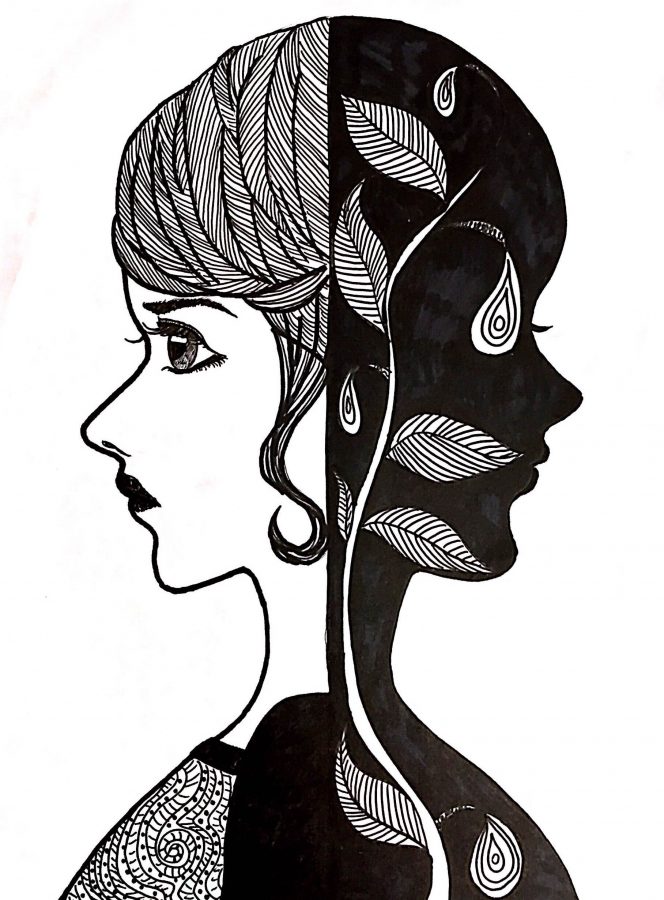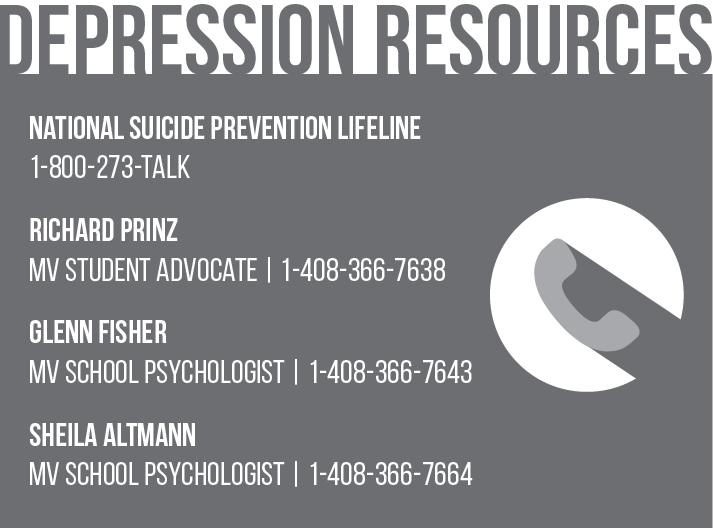Story written by Maya Murthy and Caitlyn Tjong
She was told she was fortunate to have beautiful, flawless skin. She was told that those who’d been in accidents had no choice with their scars, their burns, their disfigured skin. But she couldn’t help cutting now, couldn’t have helped picking at her scabs when she’d been a little girl and her mother had frowned on it, even then — and she couldn’t help if she didn’t want to see the look of disappointment on her mother’s face if she knew.
This was when the anonymous junior girl decided to keep her cutting — and her depression — a secret from her parents.
As depression is often regarded disgraceful in cultural stigmas and more traditional views, students refrain from openly admitting to their parents their depression for fear of rejection and disapproval — yet this is partly due to misunderstandings between parent and child.
“WHEN I GET REALLY SAD, it’s just…I feel really heavy,” she said, “and [I] just sit there.”
According to the Mayo Clinic, depression is a mood disorder that causes a constant feeling of deep sadness and loss of interest; it can affect how people feel, think and behave as well as lead to several emotional and physical problems. Currently, depression is believed to be caused by a combination of genetic, psychological and environmental factors.
Factors like divorce created an environment where the anonymous junior boy felt alone. He sought warmth and affection outside the family he no longer felt he knew — and this was when it all began.
“[My mother and sister only] knew me as the kid who came down for dinner…I didn’t feel comfortable in my own house,” the anonymous junior boy said. “I didn’t feel like I had support.”
Depression, though stereotypically equated with sadness, is better described as emotional emptiness to the extent to which those who are depressed barely function due to lack of motivation.
“I know I have my own time. I have a ton of freedom, so I just put [work] off. ‘Oh, it’s not too late. I still have a lot of time,’” the anonymous junior girl said. “These days I’m sleeping at two or three…I procrastinate for hours and hours.”
THE FIRST TIME SHE CUT HERSELF, it hadn’t been because of academic stress or the pressure of pushing herself too far. It’d been for her mother’s disappointment. She had been on the computer when she shouldn’t have and her mother, angry and disappointed when she had caught her daughter, shut herself off and ignored her — and it’d hurt her.
“I’m really close to my mom…so I was just really disappointed in myself for not listening to her and making her feel bad,” she said, “and then I decided to cut.”
Students like the anonymous junior are under the impression that admitting a mental illness will make them even more of a disappointment in the eyes of their parents. Hung Wei, a parent of MVHS alumni, two of whom were depressed, believes otherwise.
“This stigma of shame, it’s that [parents] are really ashamed of themselves, not of their kid,” Wei said. “I think teenagers don’t know that, they think [their parents] are ashamed of them, but I think most parents are ashamed of themselves, and feel like they did something wrong.”
The National Institute of Mental Health states that 2.6 million adolescents, ranging from 12 to 17 had at least one major depressive episode in 2013 — around 10.7 percent of the adolescent population. Of this group, 10.4 percent were Asians.
But mental health issues are difficult to address in Asian American communities due to cultural differences. According to the National Alliance on Mental Illness Multicultural Health Center, cultural perceptions may cause Asian Americans to feel shame or embarrassment when it comes to experiencing mental illness.
“In Asian culture having a mental illness problem means you are a loser, that means you are a psycho,” Student Advocate Ya-Huei Chi said. “There is no gray area.”
According to Wei, denial is a common response of Asian parents when initially confronted with their child’s mental illness.
“[There’s this idea that] we’re a good family, we’re good parents so that [mental illness] would never happen to us, which is absolutely not true,” Wei said. “And if it happens to us there’s something wrong with us, which is not true either.”
Because of this, some parents at MVHS, when forced to face a depressed child, do not always respond in an understanding, or forgiving, manner. When the junior boy’s family found that their “happy little boy” had been depressed and was cutting, they met him with shouts.
“They screamed at me for an hour and threatened to disown me,” he said.
In contrast, Wei said that most parents raised in the U.S. are more willing to entertain the idea that their child is mentally ill, and more willing to accept counseling.
“My general impression is that [they] are more open to counseling, it’s not a surprise to them,” Wei said. “[But] they still don’t know how to communicate with their kids in a way that they [kids] feel safe.”
According to Wei, most parents with depressed children are now aware that they are struggling on some level; their stumbling block is that the parents don’t know how to help.
“Less and less parents are not reacting, most parents know that something is wrong and they really want to ask for help,” Wei said. “That’s the problem with every parent — I love my kids too much, I don’t know what to do. Even [if] they know something is wrong, they just don’t know what to do.”
BRIDGING THE CULTURAL DIVIDE, though difficult, is possible. While an anonymous sophomore’s parents took time to come to terms with their daughter’s depression, they were eventually able to offer her the help and encouragement she needed. Wei counsels families to go to therapy as a unit, in addition to sending their child to therapy alone.
“For teenagers, sometimes you don’t want to talk to your friends, and you don’t want to talk to your parents, but a counselor can be very helpful,” Wei said. “I try to tell parents: counseling is a communication channel. It’s not ‘you’re crazy, I’m crazy’ or ‘what did I do wrong.’ It’s a safe communication channel.”
Unfortunately, the language barrier is an issue for families that may be open to counseling, but are unable to access resources in the language they are most comfortable with.
“Parents always believe that it’s all [their] children’s problem. And children say ‘no, it’s my parents’ problem’.” Chi said. “[About issues], I will say that some belong to parents, and some belong to children, so if you want to fix this here we have to work together and people have to own their part.”
“A lot of them are comfortable in their mother tongue and not in English, so it’s very hard,” Wei said. “Counseling is already very hard but when you’re communicating in a second language, it’s even harder.”
Parents who take longer to accept their child’s mental illnesses are at times forced into a decision by circumstance. Two days after his family responded with shock and disappointment to his depression, the anonymous junior boy overdosed on his medication.
“I got hospitalized,” the anonymous junior boy said, “and they’re starting to get better with [my depression]. They’re trying to help right now.”
Chi says she emphasizes working as a pair in order to avoid placing the blame solely on either side of the equation.
“Parents always believe that it’s all [their] children’s problem. And children say ‘no, it’s my parents’ problem’.” Chi said. “[About issues], I will say that some belong to parents, and some belong to children, so if you want to fix this here we have to work together and people have to own their part.”
Wei cautions people who believe that therapy or medication can be quick fixes to a problem that may otherwise take years of work to resolve.
“I work with a lot of parents and they still want a type of miracle medicine, like my child is in trouble but let’s go see this doctor and he should be fine the next day, or the next month,” Wei said. “I try to explain that there is a process, but there is hope.”
For Chi, acknowledging depression and mental illness as not necessarily negative and shameful is a way for parents and students to bridge the cultural gap. She hopes that people will begin to regard depression as a time in which someone loses themselves and, perhaps, finds themselves again — and a more profound understanding of who they are.
“[Depression] is the elephant in the room…and maybe the core issue is that people think it’s something bad,” Chi said. “It’s just something to point out the direction in our lives.”









